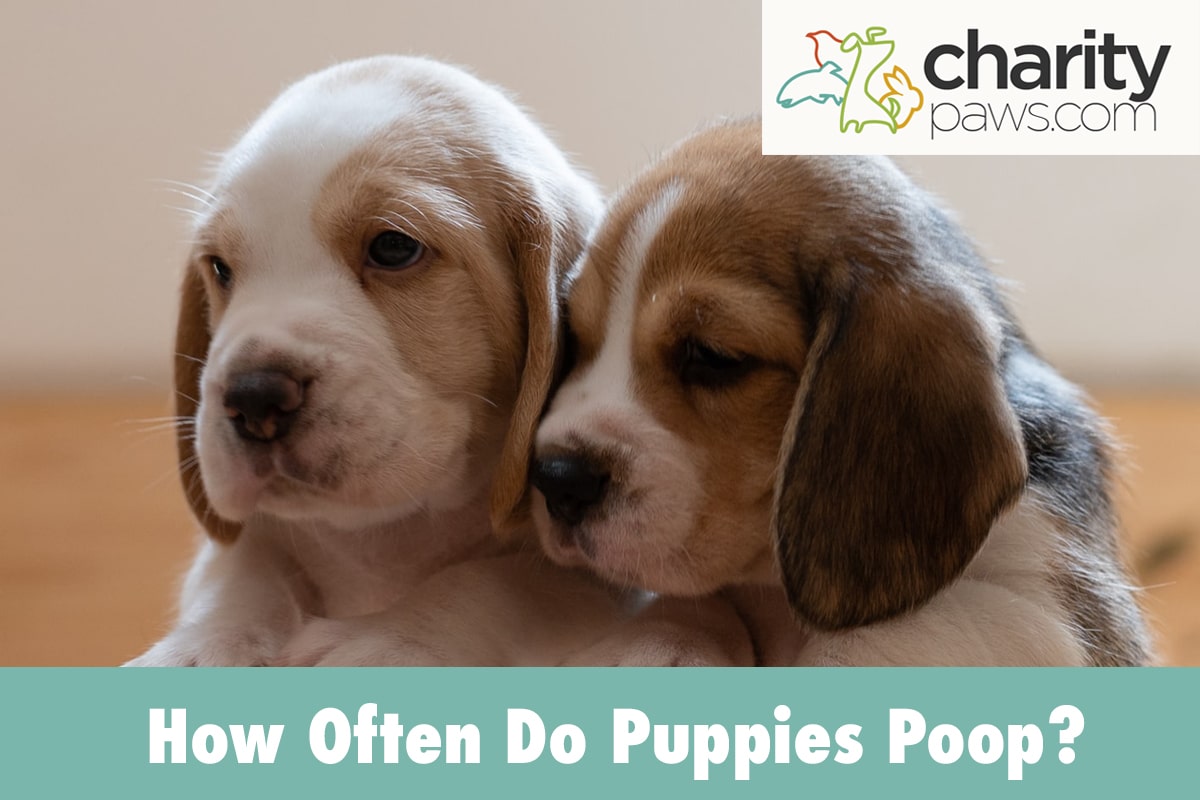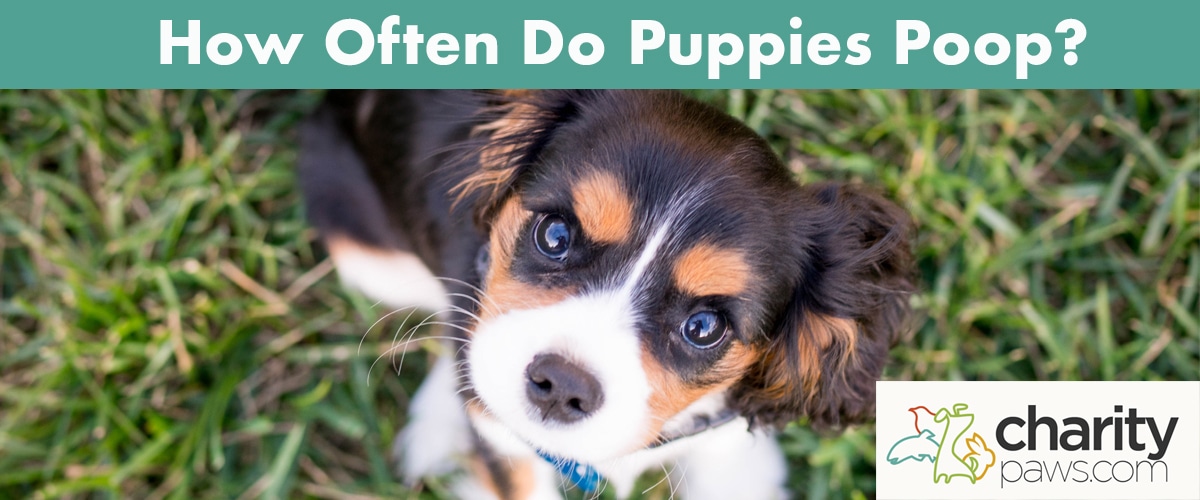When you welcome a new puppy into your home, you are likely watching them closely for any sign of concern.
A puppy’s poop habits are a wonderful peek into their current state of health, so an understanding of how often they should poop is essential.
So how many times a day should your puppy poop?
In this article we will discuss what to expect when it comes to your dog’s bathroom habits, and help you identify any signs of digestive trouble going forward.
Do Puppies Poop More Than Adult Dogs?

If you notice that your new puppy is pooping much more than the average adult dog, just know that this is completely normal.
Puppies should eat more food each day to keep up with their nutritional needs, as they require more daily calories to grow.
More calories means more meals throughout the day, and this will naturally cause a puppy to poop more than an adult dog.
Another factor to keep in mind is the fact that they are still learning how to control their bowel movements.
An adult dog may be able to poop less throughout the day with being potty trained, while a growing puppy may not yet understand this.
This can cause a puppy to poop more than an adult dog.
How Often Should A Puppy Poop?
A healthy puppy can poop anywhere from 3 to 5 times a day.
This amount can vary based on how many meals your pup consumes throughout the day, and it may even decrease as they get older and become more comfortable with potty training.
Though every puppy’s poop habits will vary, just know that you should be expecting more bowel movements than you would in an adult dog.
How Often Should I Take My Puppy Outside To Poop?

Your growing puppy will likely poop more than your adult dog, this means they will need to go outside more often.
This is especially important when a puppy is in their potty training process, as this will teach them that the outdoors is their appropriate bathroom.
When you are first welcoming your puppy into your home, you will need to take them outside more often than you may think.
A puppy that is being potty trained should go outside immediately when they wake up, after any meal, as well as after any naps and right before bed time.
You may even have to get up late at night or very early in the morning to take your puppy outside so they can poop.
This can be up to 8 times a day for some furry friends until they get a hang of potty training.
Once they catch on to the idea of only going potty outdoors, you can then decrease these bathroom trips and respond to any cues that your pup needs to go outside.
Once your puppy is fully potty trained, they can typically be taken outside 3-4 times a day.
What Should Puppy Poop Look Like?
The frequency in which your puppy poops is not the only aspect that matters when accessing their digestive health.
The appearance of your puppy’s poop is just as important as how many times they go a day, if not more.
To help you keep an eye out for any signs of abnormal poop in your puppy, let’s break it down by consistency and color.
Puppy Poop Consistency
Normal puppy poop should be firm enough to pick up easily, while also being slightly moist.
Your puppy’s poop can come in an array of shapes and sizes based on their breed, but it should always fit the standard description we just listed.
Once their stool becomes too soft or too hard, this can point to brewing GI compilations.
Some of the other poop consistencies you may see in your puppy include:
Loose stool: This refers to stool that is not yet liquid or pudding consistency, but still it is too loose to pick up easily.
Diarrhea: This refers to stool that no longer has shape, and it can range in consistency from pudding to liquid.
Hard stool: Hard stool will often feel noticeably firm when it is picked up, and it may even be in smaller segments than normal poop.
Your puppy may also struggle to pass their hard stool.
Puppy Poop Color
Healthy puppy poop should not only be moist and firm, but it should also be brown in color.
These shades of brown can vary, but you can typically expect to see browns ranging from a dark tan to chocolate colored.
Though it’s not always the case, other colors of puppy poop can point to some form of GI upset.
Some of the other poop colors that you may see in your puppy include:
Green or yellow: Green or yellow puppy poop can point to the possibility of your puppy eating grass, but it can also be a symptom of a GI infection.
Green and yellow poop can point to GI infections, intestinal parasites, and even dietary indiscretion.
Brown with white specks: Brown puppy poop with white specks can point to the presence of intestinal parasites.
While some puppies will consume pieces of toys and other items that can cause debris to collect in their poop, intestinal parasites are always on the table.
If you ever see white specks in your puppy’s poop, we suggest reaching out to your vet for guidance.
Red: Red puppy poop can develop as a result of dye in their kibble, but it can also point to the evidence of blood in their stool.
This is a stool color that should always be taken seriously, so we always suggest contacting your vet if you think your puppy has blood in their poop.
Black: Black puppy poop can be a result of bleeding in the digestive tract.
There are not any benign causes of black stool in puppies, so we always suggest reaching out to your vet ASAP if you see this in your pup.
Signs Of GI Upset In Puppies
As we discussed above, a puppy’s poop habits can be a great indicator of their digestive health.
Just as a regular poop routine and normal stool appearance can be a thumbs up in the health category, GI upset can point to underlying illness.
GI upset can cause many strange symptoms in our growing pups, so let’s list a few of the most common signs to be on the lookout for.
Some symptoms of GI upset in puppies include:
- Loose stool
- Diarrhea
- Bloody diarrhea
- Decreased appetite
- Anorexia
- Lethargy
- Vomiting
- Drooling
- Weakness
- Abdominal pain
- Whining
If you notice any of the above symptoms in your puppy, we suggest reaching out to your veterinarian for immediate guidance.
While an upset stomach can be due to a simple cause in puppies, it’s important to note that dehydration from GI upset often hits a puppy much harder than an adult dog.
Why Does My Puppy Poop So Much?
If it seems like your pup is running a constant poop factory, you may ask yourself, why is my puppy pooping so much?
Based on your puppy’s typical bowel habits, this may be entirely normal!
For example, if you are feeding your growing puppy 4 small meals a day, it makes sense as to why they are pooping more than the average dog.
As long as their poop is of a normal consistency and they are otherwise healthy, then this should be nothing to worry about.
However, if your puppy that typically poops 3 times a day is suddenly pooping 6 times a day, this may be a sign of GI upset.
In these situations it’s important to examine their stool for any change in appearance, as well as their standard behaviors and eating habits.
The best way to approach this situation is by simply giving your vet a call.
They know your pup best, so they can offer appropriate guidance going forward.
When Should I Be Concerned About My Puppy’s Poop?
If you ever notice any changes in your puppy’s pooping habits or stool appearance, it’s never a bad idea to reach out to your vet.
This is even more important if their pooping schedule changes or they are experiencing a change in poop consistency, but it’s always best to keep your vet in the loop regardless.
If any sudden changes in their poop concerns you, it is always best to be safe and give your vet a call.
How To Promote Poop Health In Puppies
Digestive health is important in a growing puppy, and thankfully, there are many ways to promote gut health in your pup going forward.
Ranging from veterinary check ups to diet modifications, here are a few of the easiest ways to maintain your pup’s gut health in the future.
- Offering a veterinary approved puppy diet
- Keeping them up to date on their recommended puppy vaccines
- Following your veterinarian’s deworming guidance
- Keeping your puppy away from any high risk environments until they are fully vaccinated
- Avoid offering your puppy anything outside of their approved diet
- Reaching out to your vet at the first sign of GI upset
Final Thoughts
Puppies poop quite a bit more than their adult dog friends, so it’s no surprise that your puppy seems like a poop machine at times.
Be sure to keep an eye on your puppy’s digestive habits as time goes on. This will help you know what is a ‘normal’ poop schedule for your new puppy.

